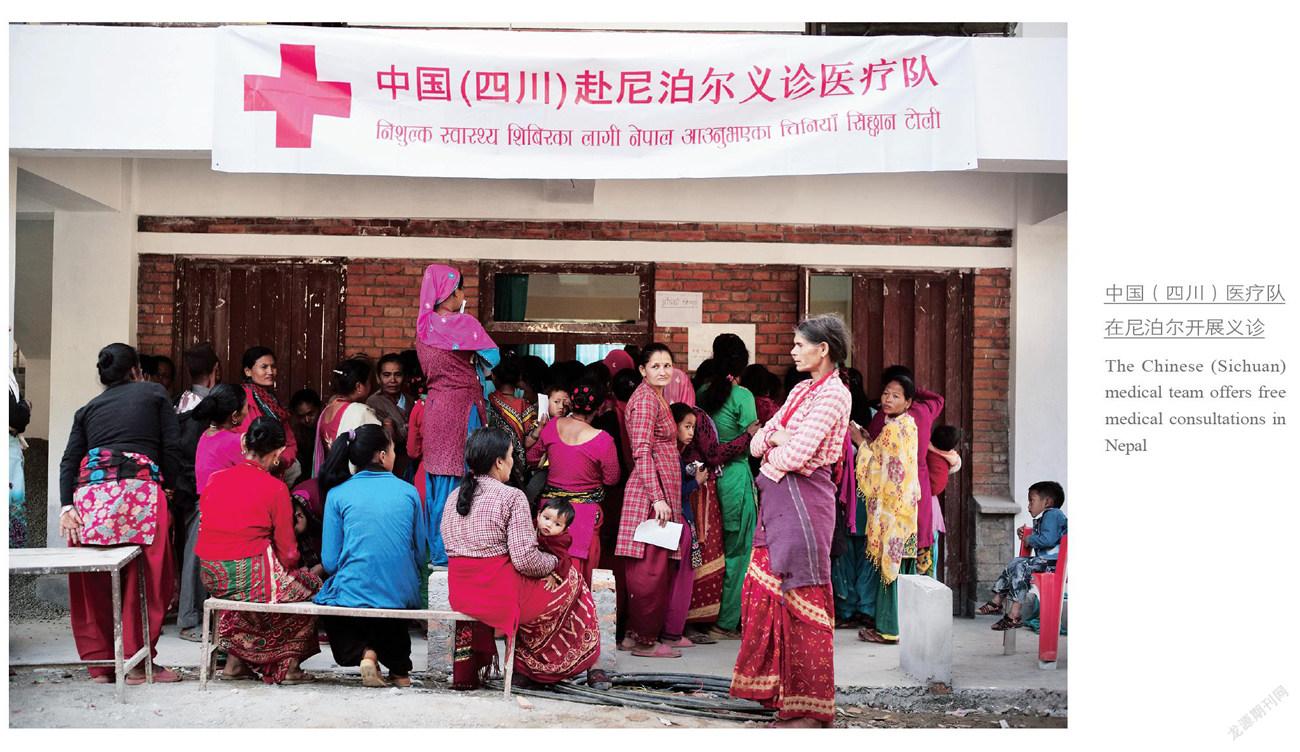“新能源领域是尼川合作的重要方向”
2022-04-29李卉嫔
李卉嫔



“尼中两国是有着悠久交往历史的友好邻居。”2月15日,在接受《一带一路报道》记者专访时,尼泊尔驻成都总领事吉米雷说道,在成都设立总领事馆就是继续深化两国关系、加深两国人民友谊的重要标志。2021年5月24日,尼泊尔驻成都总领事馆正式开馆。选择成都,一个重要原因是,四川省和一直尼泊尔保持着良好的交流合作关系。
吉米雷回忆道,第一次访问成都是2017年,他随尼泊尔议会委员会代表团,以尼泊尔工业部联合秘书的身份出访成都、长沙等地,寻找与中国在建设经济特区、高新技术开发区等领域的合作。如今他履新尼泊尔驻成都总领事再次来蓉,成都的发展速度让他惊叹:“难以置信,这座城市发展得太快了!”
【背景】2017年,尼泊尔与中国签署“一带一路”合作备忘录,希望深化两国在经济、环境、技术和文化等方面的互利合作,促进两国互联互通,增进两国人民相互了解。2021年6月,中国、尼泊尔等29个国家共同发起“一带一路”绿色发展伙伴关系倡议。
记者:四川在尼泊尔投资了重要的电力项目——马相迪梯级水电站。未来几年,尼泊尔与中国、与四川在基础设施建设方面的合作还有哪些值得期待?
吉米雷:围绕共建“一带一路”,两国进行了很多交流。2019年,尼泊尔总统班达里出席在北京举行的第二届“一带一路”国际合作高峰论坛。在圆桌峰会上,总统提到了“一带一路”对尼泊尔的重要性,我在这里引用总统的话:对尼泊尔这样的内陆国家来说,互联互通对社会经济发展至关重要,随着互联互通的加强,我们可以获得更多投资、贸易、旅游以及人文交流的机会。由此而论,尼泊尔十分期待通过共建“一带一路”加强互联互通。
未来,尼中两国在“一带一路”框架下基础设施建设方面的合作最值得期待的是跨喜马拉雅立体互联互通网络工程,这个工程有望显著提升我国的互联互通,帮助尼泊尔实现从“陆锁国”到“陆联国”的转变。工程一旦建成,也将极大地缩短四川到尼泊尔的时间,加深尼泊尔与四川的联系,也希望未来通往两地的道路越来越多。
记者:绿色发展已成为时代主题和全人类共同努力的方向。您如何看待绿色发展要求及共建“一带一路”背景下中国与尼泊尔的交流与合作?
吉米雷:绿色发展是历史发展的必然,也是世界各国共同的选择。尼泊尔致力于2030年前发展为中等收入国家,2045年前实现二氧化碳零排放,要实现这两个目标,需要更多投资发展尼泊尔基础设施和工业,且这些投资需要是环境友好型及社会责任型的。
尼泊尔80%的人面临着自然和气候灾害的威胁,因此,不是我们选择了绿色发展,而是绿色发展是我们生存之必需。“一带一路”倡议体现了绿色发展精神,尼泊尔给予了高度重视。
近些年,清洁能源在中国得到了飞速发展。中国的新能源汽车生产技术世界领先,拥有全球最大的新能源汽车市场。成都就有著名的电动汽车制造商。2021年12月,我还参观了宜宾的电动汽车生产企业。
拥有众多河流、水源充沛的尼泊尔正在大力发展水电,部分中国企业就在尼投资了水电开工程,比如,四川企业在尼泊尔投资的马相迪梯级水电站,极大地改善了尼泊尔缺电的状态。如今,尼泊尔电力资源逐步能实现自给自足,愿意开发清洁能源,以逐步取代传统能源,实现节能减排。因此,尼政府希望引进电动汽车的生产、装配企业,并为这些投资企业提供税收优惠及相关福利,这是中国新能源汽车制造商的机会。可以说,新能源领域将是尼中、尼川合作的重要方向。
【背景】2019年,中尼两国共同发表《中华人民共和国和尼泊尔联合声明》,双方同意加强教育、文化、旅游、传统医药、媒体、智库、青年等领域不同层级的交流与合作。
记者:四川与尼泊尔在旅游、传统医药等方面都有丰富的资源,您如何看待双方在这两个领域的合作?
吉米雷:旅游方面,尼中两国人民互访频繁。新冠肺炎疫情发生前,中国是尼泊尔第二游客来源国。希望疫情结束后,到尼泊尔旅游的中国游客数量能逐步回升。
传统医药方面,两国都有丰富的传统医药资源,在这一领域开展了一些合作,比如2021年4月,在电子科技大学就读的尼泊尔留学生走进四川省针灸学校,现场观摩感受中医药传统文化;同年12月举行的四川-尼泊尔中医药文化交流会上,西南医科大学附屬中医医院与尼泊尔签署了合作备忘录。目前,还有部分尼泊尔留学生在中国学习中医,希望尼中双方在这一领域的合作能继续深化。尼泊尔有一些传统医学疗法,这些治疗方法如果能与中医有效结合,将极大地提升治疗水平,造福更广大的人民。
记者:近几年,四川与尼泊尔在媒体、青年交流方面互动频繁,尼泊尔将如何继续深化这一领域的交流?
吉米雷:近些年,尼泊尔媒体人及青年十分希望多来中国,亲眼见证这里的发展,与中国人民多互动,学习中国文化,体验中国人民的生活方式。也希望这里的人多去尼泊尔看看,体验那里的生活方式及环境。
尼泊尔驻成都总领事馆的设立,旨在推动尼泊尔与四川等中国西部省市的交流与合作,促进双向投资、贸易、人员往来,进一步深化两国关系。
设立尼泊尔驻成都总领事馆是2019年签署的《中华人民共和国和尼泊尔联合声明》的内容之一。2021年,我来到成都出任尼泊尔驻成都总领事后,与在不同层面上推动尼中友好关系的中国机构代表、企业家、智库学者、记者和尼泊尔各界人士开展了富有成效的会谈。我为中国人民对尼泊尔的友好深深感动。
【数据】四川省与尼泊尔共有各级友城9对,其中正式国际友城2对,友好合作关系7对。
记者:任职尼泊尔驻蓉总领事以来,您对成都、对四川有哪些深刻的印象?尼泊尔看好四川的哪些优势?
吉米雷:成都的气候条件与加德满都很相似,这里的人民十分友好,我很快就适应了这里的生活。让我印象最深刻的是成都人的健康意识,用他们的话来说,健康就是财富。繁忙的工作之余参加强身健体活动,在这里十分常见。每到晚上,我常常能看到成群的人在街头跳舞,还有一些散步、跑步、骑车锻炼的人,我十分欣赏他们这种生活态度。
我也喜歡运动,刚来成都隔离期间,我就在自己的房间里练瑜伽,希望能与更多瑜伽爱好者一起做瑜伽。
四川的高新技术发展很快,尼泊尔希望向四川学习,共享技术发展成果,提升尼泊尔人员生活水平和质量。
来蓉工作期间,我与成都、甘孜、宜宾、眉山、乐山等地的官员举行了会谈,尼泊尔与这些市州建立合作关系或缔结友城。希望进一步推动与四川各市州在教育、文化、旅游、贸易等领域的交流与合作。
记者:成都正致力于建成世界赛事名城,今年夏天,第31届世界大学生夏季运动会将在成都举办,对此,您有哪些期待?
吉米雷:首先,恭喜成都获得第31届世界大学生夏季运动会的举办权,举办这样的国际赛事是一个城市实力的体现。届时,世界各国大学生将齐聚成都,是成都展现其魅力的绝佳时机。我很荣幸能见证这场赛事,尼泊尔也希望从这场比赛的举办中学到更多经验。毫无疑问,大运会将进一步加强国与国之间的合作,也将不断深化不同国家人民之间的友谊。我相信,尼泊尔与四川也一定会有在体育方面的合作机会。
“Nepal and China are friendly neighbors with a long history of exchanges.” In an interview with The Belt and Road Reports on February 15, Mr. Dinesh Kumar Ghimire, Consul General of Nepal in Chengdu, said that the establishment of the Consulate General in Chengdu is an important symbol of deepening bilateral relations and friendship between the people of the two countries. On May 24, 2021, the Consulate General of Nepal in Chengdu was officially opened. An important reason for choosing Chengdu is that Sichuan Province and Nepal have maintained good relations of exchanges and cooperation.
The then Joint Secretary of the Ministry of Industry of Nepal recalled that in order to seek cooperation with China in the construction of special economic zones and high-tech development zones, he paid his first visit to Chengdu and Changsha together with a delegation of the parliamentary committees of Nepal in 2017. When he arrived in the city again as the first Consul General of Nepal in Chengdu, he exclaimed, “Its unbelievable how fast the city has grown!”
[Background] In 2017, Nepal and China signed a Memorandum of Understanding (MoU) on bilateral cooperation under the framework of the Belt and Road Initiative, hoping to deepen mutually beneficial cooperation in economy, environment, technology and culture, promote connectivity between the two countries, and enhance mutual understanding between the people of the two countries. In June 2021, China, Nepal and 27 other countries jointly launched the Initiative for Belt and Road Partnership on Green Development.
Journalist: Sichuan has invested in the important hydropower projects under a cascade development model on the Marsyangdi River. In the next few years, what else can we expect from Nepals cooperation with China and Sichuan in infrastructure construction?
Mr. Ghimire: The two countries have had many exchanges under the framework of the Belt and Road Initiative. In 2019, President of Nepal Rt. Hon. Mrs Bidya Devi Bhandari attended the second Belt and Road Forum for International Cooperation in Beijing. At the Leaders Roundtable, the president mentioned the importance of the Belt and Road Initiative for Nepal. She said that for a landlocked country like Nepal, connectivity is vital for socio-economic development, and with enhanced connectivity, we can gain more opportunities for investment, trade, tourism and people-to-people exchanges. In this context, Nepal is looking forward to enhancing connectivity through Belt and Road cooperation.
In the future, the most anticipated cooperation between Nepal and China in infrastructure construction under the framework of the Belt and Road Initiative is the trans-Himalayan three-dimensional connectivity network project, which is expected to significantly improve connectivity in Nepal and help the country transform from a land-locked country into a land-linked one. Once completed, the project will greatly shorten the travel time from Sichuan to Nepal, and deepen the connection between the two sides. It is hoped that more and more roads will connect the two places.
Journalist: Green development has become the theme of the times and the direction of joint efforts of all humanity. How do you see the requirements of green development and the exchanges and cooperation between China and Nepal under the framework of the Belt and Road Initiative?
Mr. Ghimire: Green development is an inevitable trend of history and a common choice of all countries. Nepal is committed to growing into a middle-income country by 2030 and achieving zero carbon dioxide emissions by 2045. To realize the dual goal, more environment-friendly and socially responsible investment is needed to develop Nepals infrastructure and industry.
In Nepal, 80% of the population is at risk from natural and climate disasters. Therefore, it is not that we have chosen green development, but that green development is necessary for our survival. Nepal attaches great importance to the Belt and Road Initiative, which embodies the spirit of green development.
In recent years, clean energy has developed rapidly in China. China takes the lead in new energy vehicle production technology and has the largest new energy vehicle market in the world. Chengdu hosts famous electric vehicle manufacturers. In December 2021, I visited electric vehicle manufacturers in Yibin.
Nepal, with numerous rivers and abundant water, is vigorously developing hydropower. Some Chinese enterprises have invested in hydropower development projects in the country. Today, Nepal is becoming self-sufficient in electricity resources and willing to use clean energy to gradually replace traditional energy and achieve clean energy production and emission reduction targets. Therefore, the Nepali government hopes to introduce electric vehicle production and assembly enterprises, and provide tax incentives and related benefits for these investment enterprises, which is an opportunity for Chinese new energy vehicle manufacturers. New energy will be an important direction of cooperation between Nepal and China, as well as between Nepal and Sichuan.
[Background] In 2019, China and Nepal issued the Joint Statement between the Peoples Republic of China and Nepal. Both sides agreed to strengthen exchanges and cooperation at different levels in education, culture, tourism, traditional medicine, media, think tanks, youth and other fields.
Journalist: Sichuan and Nepal have rich resources in tourism and traditional medicine. What do you think of the cooperation between the two sides in these two areas?
Mr. Ghimire: In tourism, there are frequent mutual visits between the two countries Before the COVID-19 outbreak, China was Nepals second largest source of tourists. It is hoped that the number of Chinese tourists to Nepal will gradually pick up when the pandemic ends.
When it comes to traditional medicine, both countries enjoy abundant resources and have carried out cooperation. In April 2021, the international students from Nepal at the University of Electronic Science and Technology of China experienced the culture of traditional Chinese medicine at Sichuan Acupuncture and Moxibustion School. At the Sichuan-Nepal Traditional Chinese Medicine Exchange Symposium in last December, Nepal and the Affiliated Traditional Chinese Medicine Hospital of Southwest Medical University signed a memorandum of cooperation. Some international students from Nepal are studying traditional Chinese medical science in China. We hope that our two countries will continue to deepen cooperation in this field. In Nepal, there are some traditional medical therapies, which, if effectively combined with traditional Chinese medicine, will greatly improve the level of treatment and benefit more people.
Journalist: In recent years, Sichuan and Nepal have interacted frequently in media and youth exchanges. How will Nepal continue to deepen exchanges in this field?
Mr. Ghimire: Over the past few years, Nepalese media workers and young people are eager to seize more opportunities to witness the development in China, interact with the Chinese people, learn Chinese culture, and experience the lifestyle of the Chinese people. We also hope that the Chinese people can visit Nepal and experience the way of life and the environment there.
The Consulate General of Nepal in Chengdu was established to promote exchanges and cooperation between Nepal and Sichuan and other provincial regions in western China, boost two-way investment, trade and people-to-people exchanges, and further deepen the relations between the two countries.
The establishment of the Consulate General of Nepal in Chengdu is a part of the Joint Statement between the Peoples Republic of China and Nepal signed in 2019. Since I assumed my role as the Consul General of Nepal in Chengdu in 2021, I have had fruitful talks with the representatives of Chinese institutions, entrepreneurs, think tank scholars and journalists, as well as the people from all walks of life in Nepal, who have promoted friendly relations between Nepal and China at different levels. I have been deeply moved by the Chinese peoples friendship for Nepal.
[Data] Sichuan Province and Nepal have established nine pairs of friendship cities at all levels, including two ones of official international sister cities and seven ones of friendly cooperative relations.
Journalist: Since you took office as the Consul General of Nepal in Chengdu, what have impressed you most in Chengdu and Sichuan? What advantages of Sichuan is Nepal optimistic about?
Mr. Ghimire: Chengdus climatic conditions are very similar to those of Kathmandu. Chengdu people are friendly, so I soon adapted to the life here. What impresses me most is that Chengdu people are health-conscious. In their words, health is wealth. It is common here to engage themselves in bodybuilding activities after busy work. Every night, I usually see people dancing, walking, running and cycling on the streets. I really admire their attitude towards life.
I also like sports. After arriving at Chengdu, I practiced yoga in my own room in quarantine. I hope to do yoga with more enthusiasts.
Sichuan has registered rapid high-tech development, and Nepal hopes to learn from Sichuan and share results of technological development to improve the living standard and quality of the Nepalese people.
At work in Chengdu, I have had talks with officials from Chengdu, Ganzi, Yibin, Meishan, Leshan and other places. Nepal has established cooperative relations or sister city relationships with these cities and prefectures. We wish to further drive exchanges and cooperation with them in education, culture, tourism, trade and other fields.
Journalist: Chengdu is committed to building a world-renowned event host city. This summer, the 2021 FISU World University Games will be held in Chengdu. What are your expectations for it?
Mr. Ghimire: First of all, I would like to congratulate Chengdu for winning the bid to host the 2021 FISU World University Games. Holding such an international event is a fine testament of the strength of a city. At that time, college students from around the world will gather in Chengdu, which is an excellent chance for the city to showcase its charm. It is my honor to witness this event, and Nepal would like to learn more from the holding of the Games. Without a doubt, the Games will further strengthen state-to-state cooperation, and continuously deepen friendship among the people of different countries. I believe that Nepal and Sichuan will also embrace opportunities for cooperation in sports.
